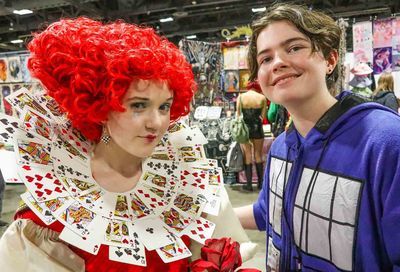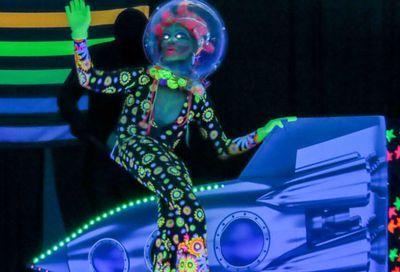25 Gay Films Everyone Should See
Must-see gay movies from 'Aimee & Jaguar' to 'Wedding Banquet'
PHILADELPHIA (1993)
In 1991, director Jonathan Demme won an Oscar for Silence of the Lambs, which featured a malicious serial killer with warped transgender inclinations. In 1993, Demme atoned for that perceived sin with this groundbreaking drama about a closeted gay lawyer (Tom Hanks) who’s fired from his conservative law firm after being diagnosed with AIDS. He retaliates by taking the firm to court — all the while coping with his deteriorating health. By this point, AIDS dramas had become almost commonplace in the lexicon of GLBT cinema, but Philadelphia was the first to usher the disease in grand Hollywood fashion before a mainstream audience. It boasts an all-star cast that included Hanks (who nabbed an Oscar for his efforts), Denzel Washington, Jason Robards, Joanne Woodward, Mary Steenburgen and a rising Spanish actor named Antonio Banderas. Though frequently heavy-handed, there’s no denying Philadelphia‘s dramatic intensity and cultural importance. It’s as unsettling as it is uplifting — in that grand Hollywood fashion, of course.
THE ADVENTURES OF PRISCILLA, QUEEN OF THE DESERT (1994)
Few films delight more than the fun, frisky and poignant tale of three drag queens on a road trip across Australia’s rough-and-tumble outback. Terence Stamp, the film’s only well-known star at the time, gives a master-class performance as the den mother with a cool, bitchy streak that would make Bette Davis blush and Joan Crawford wet her panties. Priscilla would launch the American careers of the bass-mouthed Hugo Weaving, who would later find fame as Agent Smith in The Matrix, and the dreamy Guy Pearce (L.A. Confidential, Memento). The trio are all sass and frocks, yet their performances are ablaze with honesty and conviction. The costumes are lavish and flamboyant (ostriches, anyone?) and the drag numbers off-the-charts over-the-top. And that scene with the pingpong balls? It remains one of the most unforgettable moments in any film, straight or gay. It’s all wrapped up in tenderness and friendship, proving that when gays stick together, the bond generated is as strong as any blood-related clan’s.
THE BOYS IN THE BAND (1970)
CRUISING (1980)

Boys in The Band
Love ’em or hate ’em, you can’t deny the historical impact of this pair of era-defining bookends from director William Friedkin (The Exorcist). Boys in the Band was filmed as a faithful recreation of Mort Crowley’s stage play — even including members of the original off-Broadway cast, notably Leonard Frey, whose bitter, self-loathing Harold serves up a beggar’s banquet of caustic tongue lashings to his pals. Boys is awash in self-hating stereotypes, and yet Crowley’s work captures, if not the reality, then at least the perceived notion of how gay men treated one another in the late ’60s. It wasn’t about support and brotherhood, but about ripping one another to emotional shreds, until all that’s left is bloody pulp. Much more problematic, but no less fascinating, is Cruising, which suffers from a sensationalistic, crudely-wrought, serial-killer storyline, and an undercurrent of homophobia. And yet, Cruising is a must-see for several reasons, not the least of which is its depiction of Lower Manhattan’s S&M leather scene, just before AIDS brought everything to a screeching, tragic halt. The movie is as close as we have to a visual historical document, as Friedkin takes us directly into the heart of what was then an underground, disquieting subculture of the gay movement (but what is now a vital and celebrated part of the gay mainstream). Cruising also suffers at the hand of star Al Pacino, who, despite his swarthy, smolder-and-steam handsomeness, feels miscast in the role of an undercover cop forever changed by his S&M experiences. Who can forget the brain-searing image of Pacino, hog-tied and ready for action at the hands of a pickup, all in the name of duty?
THE CRYING GAME (1992)
For quite a few months in 1992, the buzz around The Crying Game was the loudest sound in popular culture. What’s the secret? The Crying Game was hiding something and everyone wanted to know what it was. Amid a tale of Irish terrorists and intrigue, Jaye Davidson as Dil stole the show by hiding his candy. For those few who didn’t know the secret when they entered the theater, Davidson’s portrayal of a sexy, transgender seductress brought gender issues to the fore as few movies have before or since.
THE INCREDIBLY TRUE ADVENTURE OF TWO GIRLS IN LOVE (1995)
Maybe you know Nicole Ari Parker from Soul Food, or Laurel Holloman from The L Word. But back in 1995, they played high school students Evie and Randy. Such perfect and lucky casting, considering they were newcomers, is what gives Two Girls in Love the sort of infectious charm that makes you want to hug your girlfriend, boyfriend, dog, cat, yourself – whatever you can get your arms around. It’s not too heavy, it’s not too meaningful, it’s not too artistic. It’s just an endearingly sweet movie about adolescent romance that leaves everyone – at least through the closing credits – wishing he was a 17-year-old lesbian.
TONGUES UNTIED (1990)

Tongues Untied
Directed by Marlon Riggs, Tongues Untied moves as an epic poem, with help from poet Essex Hemphill. With both men having died of AIDS-related complications in the 1990s, this beautiful, unconventional film would be considered a time capsule, were it not so timeless. Not plot-driven, not a documentary, Tongues Untied conveys feelings and images of black and gay experience. As the movie itself defies easy categorization, so too does it strive to show how compartmentalizing identity – black or gay or any other – is futile, that we are organic combinations of identities that grow and change and won’t be ignored. And it made the point with a signature snap, thanks to the film’s guide to ”snapthology.”
TORCH SONG TRILOGY (1988)
If the gay world didn’t have Harvey Fierstein, we would have had to invent him. That voice, that attitude, that persona — he’s a bundle of stereotypes that transcends the label. Torch Song Trilogy, adapted from his Tony Award-winning play, brought Fierstein to the masses — just the thing for all the gay kids living between the coasts (or even on them) who still lacked for images of the lives they could possibly live. And Trilogy presented a lot of images — from Fierstein’s over-the-top Arnold Beckoff to Matthew Broderick’s brave (yet lamentably doomed) Alan Simon. Torch Song Trilogy goes for laughs and tears in equal measure — and earns them both honestly. It deserves its position as one of our community’s cultural touchstones.
TRANSAMERICA (2005)
As Bree, a pre-op male-to-female transgender, Desperate Housewives’ Felicity Huffman brings depth, warmth and deep-seated soul — not to mention a piquant comic sensibility — to a role that a lesser actress might have turned into a surface caricature. The spry, casual narrative follows Bree’s relationship with her teenage son (Kevin Zegers, just cast as Clyde Barrows in the controversial remake of Bonnie and Clyde) — and his acceptance of the man who would be his mother. Written and directed with intelligence, veracity and wit by Duncan Tucker, Transamerica is a triumphant mainstream nod to transgenders everywhere.
WALK ON WATER (2004)
U.S. gay audiences got their first experience with director Eytan Fox in Yossi and Jagger, a bittersweet love story of two Israeli soldiers set against the backdrop of the never-ending Palestinian conflict. Fox showed he could juggle moments of sweetness and light right alongside weightier issues and conflicts, without losing site of the humanity at his story’s core. But if 2002’s Yossi and Jagger was a taste of Fox’s filmmaking abilities, 2004’s Walk on Water proved his potential. The story of an Israeli Mossad agent assigned to assassinate a Nazi war criminal, it’s a fascinating meditation on the persistence of the past and the nature of revenge, on the intersections of masculinity and sexual orientation, on the idea that our own hatreds must be confronted if we want to end the hatred of others. Though Fox is gay, Walk on Water isn’t a traditionally gay film — but it’s an affirmation that being gay is an essential part of the tapestry of the world.
THE WEDDING BANQUET (1993)
It was only his second film, but you could already tell director Ang Lee was destined for greatness — a greatness that would lead him to one day direct Brokeback Mountain. This light tale of a gay Taiwanese man who agrees, at the behest of his American lover, to enter into a marriage of convenience with a young woman in need of a green card is a frothy, whimsical cross-cultural romp. There’s a buoyancy to The Wedding Banquet — a lightness that Lee would never again revisit — and, as with many of the films that made it to this list, it is marked by a profound affirming quality, as a gay character finds liberation in bursting free of his closet. Brokeback may leave you in tears, but The Wedding Banquet leaves you in the mood for celebrating.
Read more:
25 Gay Films Everyone Should See: The Sequel
25 Gay Films Everyone Should See: Part 3D
13 Camp Films Everyone Should See
Support Metro Weekly’s Journalism
These are challenging times for news organizations. And yet it’s crucial we stay active and provide vital resources and information to both our local readers and the world. So won’t you please take a moment and consider supporting Metro Weekly with a membership? For as little as $5 a month, you can help ensure Metro Weekly magazine and MetroWeekly.com remain free, viable resources as we provide the best, most diverse, culturally-resonant LGBTQ coverage in both the D.C. region and around the world. Memberships come with exclusive perks and discounts, your own personal digital delivery of each week’s magazine (and an archive), access to our Member's Lounge when it launches this fall, and exclusive members-only items like Metro Weekly Membership Mugs and Tote Bags! Check out all our membership levels here and please join us today!





















